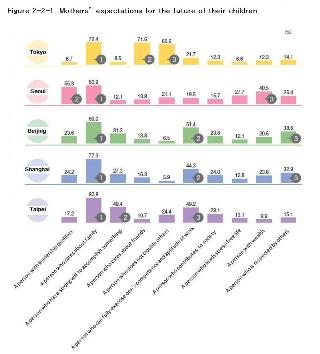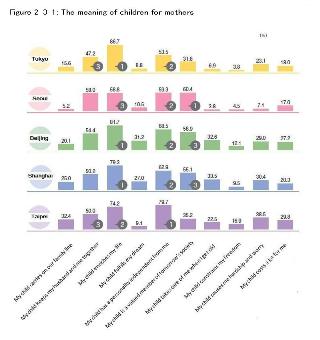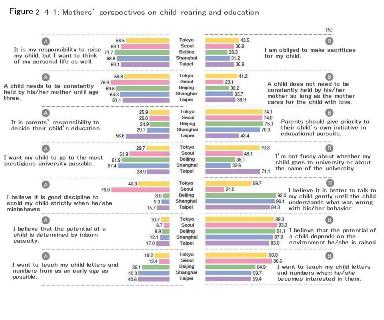- Excerpts from the "2010 Report on Children: Questionnaire Survey on Children's Daily lives and Parent's Child-rearing in Five East Asian Cities"
Amid the current wave of globalization, we hear, along with daily updates and events in Japan, increasingly more news from China, Korea and Taiwan - our neighbors. Japan has many things in common with these countries; for example, we are geographically part of East Asia, sharing the social ethics of Confucius and the culture of Chinese characters. Nevertheless we do have some differences in culture, economy and social systems. With these in mind, one might raise questions about child-rearing: How do we differ in bringing up our children? What do we have in common?
The Benesse Institute for Child Sciences and Parenting conducted research using a cross-national survey in five East Asian cities (i.e., Tokyo, Seoul, Beijing, Shanghai and Taipei) in the period February to May 2010. The target group was parents of children between the age of three and six years. The principal purpose of the survey was to collect information on the current status of children's daily lives as well as parents' attitudes and practices regarding child-rearing. Based on the survey results, we will discuss here the common aspects and differences found among the five cities in terms of children's daily lives and parent's attitudes towards child-rearing. (The analysis sample was limited to mother respondents.)
Survey Overview
| Theme | The current status of children's daily lives as well as parents' attitudes and practices regarding child-rearing in five East Asian cities (i.e. Tokyo, Seoul, Beijing, Shanghai, and Taipei) |
| Survey topics | Daily schedule of children/ Types of children's enrichment activities/ Expectations of kindergartens & daycare centers/ Mothers' perspectives on child-rearing and education/ Expectations for the future of children/ Aspects of parenting to which parents devote the most effort/ Mother's attitude towards child-rearing, etc. |
| Tokyo | Seoul | Beijing | Shanghai | Taipei | |
| Period | Mar 2010 | Feb-Mar 2010 | Mar-May 2010 | Mar-May 2010 | Mar-Apr 2010 |
| Target group | Parents of pre-school children between three and six years old | ||||
| No. of questionnaires sent | 3,805 | 23,643 | 33,304 | 29,671 | 9,029 |
| No.of valid responses | 1,693 | 969 | 765 | 1,073 | 1,745 |
| Survey area | Urban areas within 40 km from Tokyo Station | Seoul, Gyeonggi-do |
Beijing | Shanghai | Taipei, Taipei County, Keelung, Taoyuan County |
| Method | Distribution and collection of questionnaires by post | Online survey | Distribution and collection of questionnaires by post | ||
The majority of mothers in all five cities expect their children to be "a person who cares about family."As the second desirable characteristic in children, mothers in Tokyo chose "a person who can build good relationships with other people" while mothers in Seoul, Beijing, Shanghai, and Taipei chose "a person with leadership qualities."
First we examined the results of the survey regarding mothers' expectations for the future of their children. Mothers were asked to choose three answers out of ten to the question "What kind of person do you expect your child to be in the future?" In all five East Asian cities the top answer was "a person who cares about family," which accounted for 60-80% of those surveyed.
The second and third ranked answers, however, vary depending on the city. Mothers in Tokyo chose as the second answer "a person who cares about friends" (71.6%), and as the third, "a person who does not trouble others" (65.6%). Mothers in Seoul chose "a person with leadership qualities" (55.3%) and "a person with wealth" (40.5%) respectively. In Beijing and Shanghai, the second and third ranked answers were "a person who can fully exercise one's competency and aptitude at work" (Beijing 51.4%, Shanghai 44.3%) and "a person who is respected by others" (Beijing 38.6%, Shanghai 32.9%), while in Taipei, mothers answered "a person who has a strong will to accomplish something" (49.4%) and "a person who can fully exercise one's competency and aptitude at work" (49.2%) respectively.
In sum, the differences indicated are that mothers in Tokyo expect their children to acquire social skills for relationship-building, while mothers in the other four cities would prefer their children to take on roles of leadership in their society in the future.
Mothers' expectations for the future of their children
Enlarge
* Respondents were asked to choose three answers out of ten.
* The analysis sample was limited to mother respondents.
* In order of priority the top three answers in each city are marked ①, ②, and ③.
* For respondents in Seoul, the answer "a person who enjoys life in a slow relaxed way" was provided instead of the answer "a person who leads stress-free life."
For mothers in all five cities, children enrich life
Next we will discuss the mothers' feelings towards their children. They were asked to choose multiple answers to the question "What does your child mean to you?" When ranked by the number of responses received, the answer "My child enriches my life" ranked first in Tokyo, Beijing, and Shanghai; second in Taipei; and third in Seoul. The answer "My child has a personality independent from me" also received a high response from mothers in the five cities, the highest being 79.7% of respondents in Taipei. Another answer chosen by a large percentage of mothers was "My child is a valued member of tomorrow's society," especially remarkable in Seoul (60.4%), Beijing (58.9%) and Shanghai (55.1%).
These findings revealed that mothers in all five cities consider their child enriches their life and has an independent personality. Furthermore, the fact that the answer "My child is a valued member of tomorrow's society" received a high response from mothers in Seoul, Beijing, and Shanghai indicates that there is a strong tendency among these mothers to regard their children as a member of society.
The meaning of children for mothers
Enlarge
* Multiple answers were allowed.
* The analysis sample was limited to mother respondents.
* In order of priority, the top three answers in each city are marked ①, ②, and ③.
Compared with mothers in Tokyo, mothers in the other four cities are keener to give their children the best education
Viewing the results of the survey in five East Asian cities, we have learned what mothers in each city hope for their children and what the children mean to them. Now we move on to the next stage of our discussion: mothers' perspectives on child-rearing and education. Mothers were asked to choose between two clearly opposite choices "A" and "B" as follows, regarding the question "Based on your beliefs and attitude towards child-reading, which statement do you agree with more?" The following results suggest some interesting insights, and here we will focus ontwo of the educational topics among these choices and discuss the results.
The first topic is basic literacy and numeracy skills. Between two statements "A: I want to teach my child letters and numbers when he/she becomes interested in them" and "B: I want to teach my child letters and numbers from as an early age as possible," mothers who agreed with B accounted for 19.2% in Tokyo and 13.4% in Seoul, while much higher percentages were seen in Beijing (35.1%), Shanghai (40.3%), and Taipei (40.6%). For the second topic on university education, two statements were "A: I want my child to go to the most prestigious university possible" and "B: I'm not fussy about whether my child goes to university or about the name of the university." The results show that 29.7% of the mothers in Tokyo and 28.9% in Taipei agreed with the statement B, while a greater percentage of mothers agreed in Seoul (51.9%), Beijing (61.9%) and Shanghai (67.4%). This indicates that mothers in Seoul, Beijing, Shanghai, and Taipei seem to be more enthusiastic about education, compared with mothers in Tokyo.
Mothers' perspectives on child-rearing and education
Enlarge
* The analysis sample was limited to mother respondents.
Children's enrichment activities: the majority of children in Tokyo are taking part in sports and educational activities, while the majority of those in Seoul, Beijing, and Shanghai are doing educational and art activities, and in Taipei art activities
Last, we will discuss the current status of children's education. We have conducted the survey on children's participation in self-enrichment activities in the five cities, and found out that the percentage of children who take part in any of these activities is quite high, i.e., Beijing 78.2%, Shanghai 74.4%, Seoul 68.3%, Tokyo 59.8%, and Taipei 56.6%.
We have also noted that there are differences in preference for self-enrichment activities among the five cities. For example, in Tokyo, popular choices are sports classes such as swimming and gymnastics, as well as educational classes such as distance learning, English language learning, etc. This high proportion of children in sports classes, in particular, is remarkable in Tokyo compared with the other four cities. In contrast, educational and art classes enjoy high popularity in Seoul, Beijing and Shanghai. The most popular choices in Seoul, for example, are Korean language (Hangul) classes, in Beijing, drawing/crafts classes, and in Shanghai, English language learning and drawing/crafts classes. In Taipei, art classes are highly popular, revealing drawing classes as the top choice.
Children's self-enrichment activities

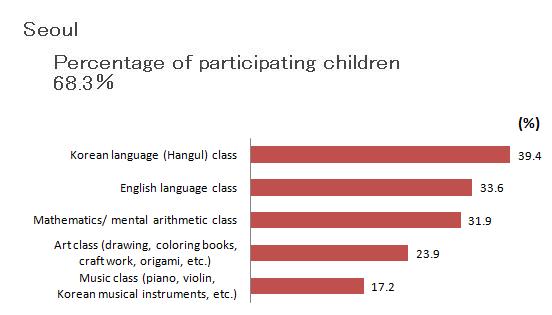


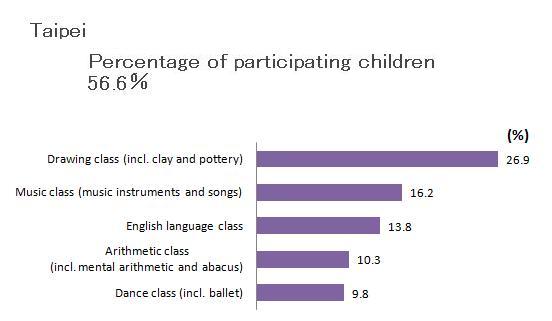
* Breakdown of the types of self-enrichment activities: multiple answers were allowed.
* The above percentages are calculated using the total number of survey respondents as a parameter, including those who answered "My child doesn't engage in such activities."
* With respect to the types of self-enrichment activities, the respondents were asked about the state of children's participation in either extracurricular activities offered by kindergartens and daycare centers (subject to additional fees), and those offered by other institutions. The above percentages are calculated using positive answers where the respondents said their children engage in at least either one.
As discussed above, this cross-national survey reveals that there are common aspects and differences of child-rearing among the five East Asian cities. Mothers in all the cities see children as enriching their life, and expect their children to be a person who cares about family. However, some expectations differ: mothers in Tokyo expect their children to acquire social skills for relationship-building, while mothers in the other four cities would prefer their children to take on leadership roles in society. Some differences can also be seen in mothers' perspectives on child education and children's participation in self-enrichment activities: compared with mothers in Tokyo, those in the other four cities seem to be more enthusiastic about education. Therefore we have come to the conclusion that although these cities share similar social and cultural backgrounds as part of the East Asian region, the current status of children's daily lives as well as parents' attitudes and practices regarding child-rearing differ somewhat from each other, reflecting the contrasting societal conditions and values of each city.



